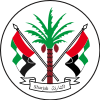
Back Sharjah Afrikaans الشارقة Arabic الشارقه ARZ Şarja Azerbaijani شارجه AZB Шарджа (горад) Byelorussian Шарджа Bulgarian শারজাহ Bengali/Bangla Xarjah (ciutat) Catalan Sharjah (kapital sa emirato sa Nagkahiusang Emiradang Arabo) CEB
Sharjah
ٱلشَّارقَة | |
|---|---|
| Sharjah | |
Clockwise from top: Al Khan Lagoon, Al-Qasba Canal, Heritage District, Al-Noor Mosque, Cultural Palace, Blue Souk | |
|
| |
| Coordinates: 25°21′27″N 55°23′27″E / 25.35750°N 55.39083°E | |
| Country | United Arab Emirates |
| Emirate | Emirate of Sharjah |
| Government | |
| • Type | Absolute monarchy |
| • Sheikh | Sultan bin Muhammad Al-Qasimi |
| Area | |
| • Metro | 235.5 km2 (90.9 sq mi) |
| Population (2022–23) | |
| • Metropolis | 1,800,000[1] |
| GDP | |
| • Total | US$ 58.9 billion (2023) |
| • Per capita | US$ 32,100 (2023) |
Sharjah (/ˈʃɑːrdʒə/; Arabic: ٱلشَّارقَة aš-Šāriqah, Gulf Arabic: aš-Šārja[3]) is the third-most populous city in the United Arab Emirates, after Dubai and Abu Dhabi. It is the capital of the Emirate of Sharjah and forms part of the Dubai-Sharjah-Ajman metropolitan area.
Sharjah is the capital of the eponymous emirate. The emirate shares legal, political, military and economic functions with the other emirates of the UAE within a federal framework, although each emirate has jurisdiction over some functions such as civil law enforcement and provision and upkeep of local facilities. Sharjah has been ruled by the Al Qasimi dynasty since the 18th century.
The city is a center for culture and industry, and alone contributes 7.4% of the GDP of the United Arab Emirates.[4] The city covers an approximate area of 235 km2 and has a population of over 1,800,000 (2022–2023).[1] The sale or consumption of alcoholic beverages is prohibited in the emirate of Sharjah without possession of an alcohol license and alcohol is not served in hotels, restaurants or other outlets in Sharjah, due to the Muslim majority in the area. This has helped Sharjah increase the number of Islamic tourists who visit the country.[5] Sharjah has been officially named as a WHO healthy city.[6] The 2016 edition of QS Best Student Cities ranked Sharjah as the 68th best city in the world to be a university student.[7] Sharjah is regarded as the cultural capital of the UAE,[8][9] and was the Islamic culture capital of 2014[10] and Sharjah World Book Capital for 2019 by UNESCO.[11]
On 1 January 2022, Sharjah made history when its public sector adopted a four-day working week and a three-day weekend, becoming the first government sector in the Gulf region and the entire Middle East to fully adopt a four-day working week.[12]
- ^ a b Cite error: The named reference
sharjah-census-2022was invoked but never defined (see the help page). - ^ "TelluBase—UAE Fact Sheet (Tellusant Public Service Series)" (PDF). Tellusant. Retrieved 11 January 2024.
- ^ Qafisheh, Hamdi A. (1997). NTC's Gulf Arabic-English dictionary. NTC Publishing Group. p. 351. ISBN 978-0-8442-4606-2.
- ^ "About Sharjah". This Is Sharjah. Archived from the original on 15 March 2015.
- ^ "In search of silence in Sharjah, the UAE's up-and-coming emirate". Lonely Planet. Retrieved 30 June 2024.
- ^ "Sharjah officially named WHO Healthy City". Sharjah Update. 27 April 2016. Archived from the original on 22 April 2016. Retrieved 2 May 2016.
- ^ "QS Best Student Cities 2016". topuniversities.com. 30 November 2015. Archived from the original on 22 December 2015. Retrieved 12 April 2017.
- ^ Khamis, Jumana (23 November 2013). "Sharjah, the cultural capital of the UAE". Gulf News. Archived from the original on 15 February 2017. Retrieved 21 October 2024.
- ^ "Sharjah's tourism focus is all about Islamic culture". The National. 17 December 2013. Archived from the original on 20 April 2017. Retrieved 24 February 2015.
- ^ "2014 is Sharjah's Islamic Culture Capital year, and it will be a busy one for Sheikh Sultan – The National". thenational.ae. 28 December 2013. Archived from the original on 15 February 2017. Retrieved 12 April 2017.
- ^ "Sharjah named World Book Capital 2019". 26 June 2017. Archived from the original on 31 October 2017. Retrieved 10 May 2019.
- ^ Reynolds, Rory; Amir, Salam Al (9 December 2021). "Sharjah to adopt three-day weekend". The National.









